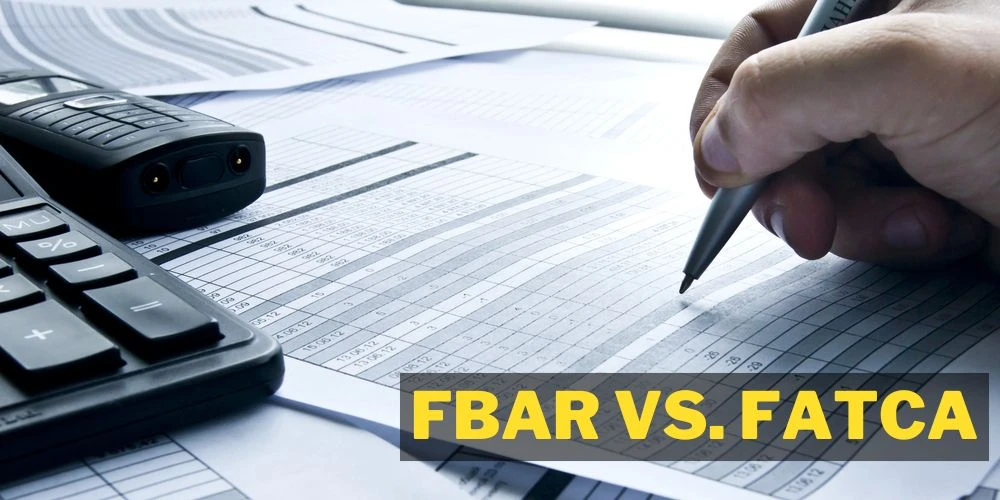Understanding the complexities of federal tax obligations when it comes to foreign financial assets is of paramount importance for US persons.
The US government has implemented multiple measures to curb tax evasion and ensure proper reporting of overseas assets.
Two key regulations central to these efforts are the Foreign Bank and Financial Accounts Report (FBAR) and the Foreign Account Tax Compliance Act (FATCA).
Despite sharing common objectives, they pose different requirements. It’s crucial for taxpayers to discern between FBAR vs FATCA to maintain compliance and avoid hefty penalties.
Understanding the Basics
Before delving into comparisons, one must first grasp what FBAR and FATCA are and the reasons behind their inception.
What is FBAR?
The FBAR refers to a report that US persons must file if they have foreign financial interests exceeding a certain threshold.
The Financial Crimes Enforcement Network (FinCEN), a bureau of the US Department of Treasury, oversees the FBAR. Enshrined under the Bank Secrecy Act, it seeks to expose financial crimes, including tax evasion.
What is FATCA?
FATCA stands for the Foreign Account Tax Compliance Act, a law with a more global outlook. Enacted in 2010, it requires US taxpayers to report foreign accounts and offshore assets.
It also demands foreign financial institutions to report information about American clients to the IRS. By doing so, FATCA makes it harder for US persons to hide income and assets abroad.
FBAR vs FATCA Detailed Comparison
Understanding who must file and the specific requirements of FBAR and FATCA provides clarity on the obligations of US persons.
Who Needs to File
FBAR
If a US person has an interest in or signature authority over one or more accounts in a foreign country, and the aggregate value of those accounts exceeds $10,000 at any point during the calendar year, they must file an FBAR.
This rule applies regardless of residency and extends to various types of accounts and financial interests.

FATCA
FATCA casts a wider net with different reporting thresholds that vary based on residency and filing status.
US taxpayers, including individuals living abroad or green card holders, must file if they reach the specified asset thresholds. These thresholds start at $50,000 for domestic filers but are higher for expatriates.
Reporting Requirements
FBAR
The FBAR mandate is to report the name on the account, account number, the name and address of the foreign bank, the type of account, and its highest balance during the year. Filing is done electronically through the BSA E-Filing System.
FATCA
FATCA reporting, captured in Form 8938, demands more detailed information. The IRS wants not only the account balance but also income derived from those assets. Unlike the FBAR, FATCA forms are part of the annual tax return.
Deadlines and Penalties
FBAR
The annual deadline for filing an FBAR is April 15, with an automatic extension available until October 15.
The penalties for failing to file an FBAR can be severe, reaching up to $10,000 for non-willful violations and the greater of $100,000 or 50% of the account balances for willful violations.
FATCA
FATCA forms must be filed with the income tax return by the due date, including extensions. Penalties start at $10,000 and can increase to $50,000 for ongoing failure after IRS notification.
Key Differences Highlighted
While both regulations enforce the disclosure of foreign financial assets, the key differences lie in their purpose, filing requirements, reporting thresholds, and penalties.

FATCA is more encompassing with a higher threshold, while FBAR is focused on bank accounts and has lower reporting criteria.
Compliance Tips
Staying on top of FBAR and FATCA requirements can seem daunting, but a few practices will help maintain compliance.
Regularly review your foreign assets and keep thorough records. If you approach the filing threshold, prepare to report.
Professional tax software or advisors can provide valuable guidance in navigating the regulations.
Pro Tips
Be meticulous with information on your FBAR and FATCA forms to prevent costly errors. Tax laws evolve, so keep up with the latest developments.
Consult a tax expert, as the cost of professional advice often pales in comparison to the penalties for incorrect or missed filings.
Frequently Asked Questions
Do I need to file both FBAR and FATCA?
If you meet the criteria for both, you must file each one.
Can I file FBAR or FATCA late without facing penalties?
It’s possible, but assess your situation promptly to minimize or avoid penalties.
How do I determine if my foreign assets meet the reporting threshold?
Regularly review your assets’ total value relative to the thresholds for FBAR and FATCA.
What happens if I inadvertently fail to report an account?
Address the oversight as soon as possible. The IRS offers programs for voluntary disclosure.
Are there any exceptions to the reporting requirements?
Some exceptions apply, such as certain foreign retirement accounts for FATCA.
Conclusion
For any US person with a stake in foreign financial institutions, understanding and complying with FBAR and FATCA is non-negotiable.
With significant penalties for non-compliance, it’s prudent to seek advice from a tax professional and stay informed on regulation changes.


 Tags:
Tags:










